In the wake of two failed school funding measures, the outlook for the Coeur d’Alene school district is grim, district officials told trustees at a special meeting Monday night.
A failed $25 million supplemental levy means that more than 300 district staffers — including teachers, coaches, librarians, school resource officers, and more — could lose their jobs.
But, according to Superintendent Shon Hocker, there’s hope: Trustees unanimously approved putting a two-year $25 million supplemental levy on the May ballot.
If the needed simple majority of voters approve the new measure, the impending crisis could be averted.
It’s a big “if” in a community that just failed a perpetual, $25-million levy and a five-year, $25 million plant facilities levy. But with the levy reduced to two years instead of perpetuity and with the plant facilities levy off the table, trustees hope voters will show their support.
“I hope that our community is empowered to go vote after we continue to spend the next six weeks showing them the seriousness of what will happen if the levy fails,” Hocker said.
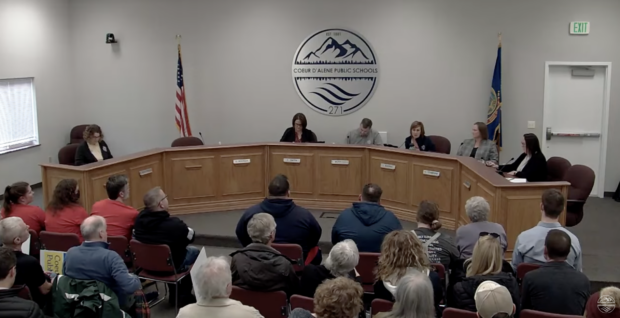
What’s at stake: hundreds of jobs and more
After seeing the election results Tuesday night, Trustee Heather Tenbrink didn’t sleep.
It didn’t get better from there.
On Wednesday, the day after the election failures, Trustee Casey Morrisroe said he was at a local high school that had 12 teachers ask for letters of recommendation so they could apply for jobs elsewhere.
“It’s been a horrible week to just think of what our schools could look like — the lives of our students, our teachers, our parents or families,” Board Chair Rebecca Smith said. “The impact of the loss of this levy will be felt in Coeur d’Alene for years to come.”
Eric Davis, the district’s human resources director, elaborated on why the failures cast such a dark cloud — especially the supplemental levy, which comprises 25% of the district’s budget.
“This last week we’ve been in really dark places as we tried to figure out what we would do to balance the budget if we were $25 million short,” he said.
More than 300 employees would lose their jobs, including teachers, athletic directors, librarians, and school resource officers. Full-day kindergarten would be pared back to half-day, and state competition travel for sports teams would be cut.
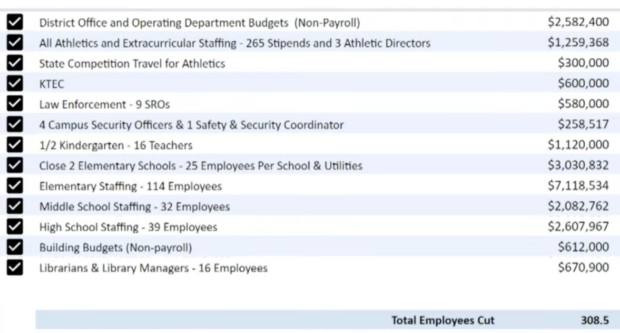
“None of these suggestions are good for kids, or good for the district,” Davis said. “Not one of them.”
Hocker equated the impacts of the funding loss to closing 4.5 schools, eliminating all sports and extracurriculars, and other drastic measures.
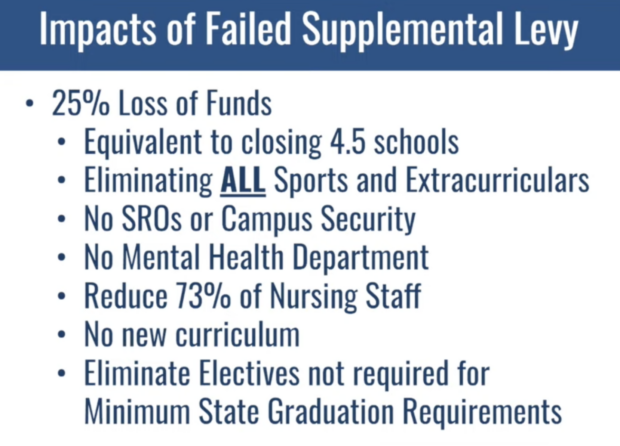
“Not enough people understood the gravity of the levy,” Hocker said.
He encouraged trustees to put a two-year, $25 million supplemental levy back on the ballot to avoid disastrous consequences for the district.
“What I need is to be able to tell our employees what their future may or may not hold,” Hocker said. “If the board chooses to renew a $25 million ask, there’s at least a little hope in their eyes for the next six weeks until the next election.”
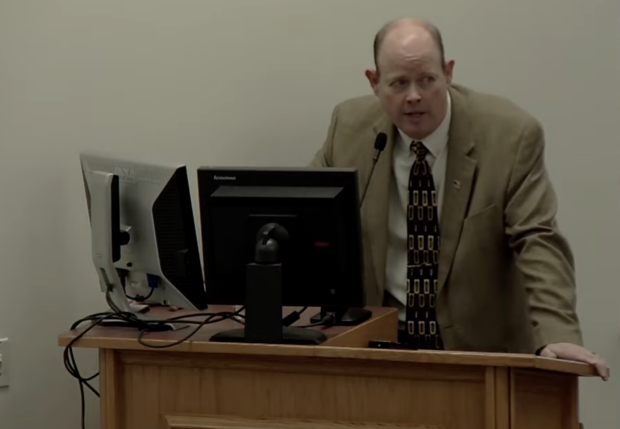
The board will not pursue a plant facilities levy in May, but Hocker emphasized that those building needs aren’t going away.
“A third of our buildings are over 30 years old,” he said. “Things just keep breaking and failing.”
Distrust and division drove the election failures
During the meeting, board members also sought answers: Why did these measures fail? Ultimately, they credited public distrust of the school district, misinformation, and community division.
A few trustees called for the board and district officials to self-reflect rather than cast blame on third parties. Just before the election, Hocker and Morrisroe called out a local anti-levy campaign as “bogus,” “un-American” and even “disgusting.”
One board member, Allie Anderton, went a step further by directly chastising Hocker and Morrisroe: “It’s never okay to make derogatory, inflammatory statements or participate in name-calling.”
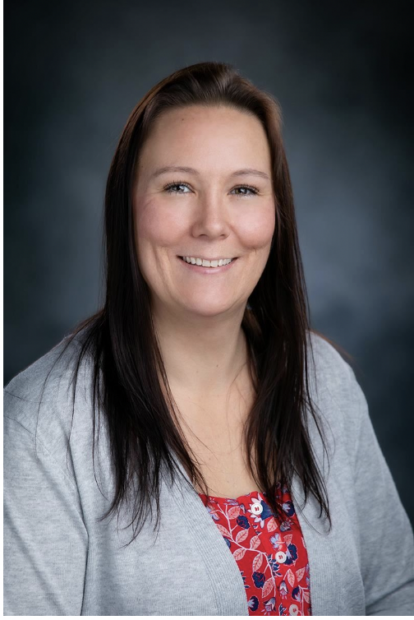
Anderton said the comments caused “more division between the community and the district … further alienating the public that we so desperately needed support from.”
The “significant erosion of trust between the community and the district” is not new, Anderton said, and stems from continued failures to validate community concerns related to LGBTQ student policies and library books.
Anderton expressed her frustrations with the processes for assessing questionable books, and the delay in making decisions related to transgender students’ use of bathrooms and locker rooms.
Smith pointed out that decisions relating to transgender students had been postponed until April 11 in order to await any possible guidance from the Legislature.
Anderton called for the board and superintendent to create “an action plan addressing the trust issues in our community,” which she said would be the only way to ensure the new levy ask would pass.
After approving the two-year, $25 million levy ask, board members did verbally commit to rebuilding trust and working together with the community.
